 Dear Stephen,
Dear Stephen,
After well over thirty years of learning, growing, and fond affection, it pains me to say that I believe our relationship must end. We have grown apart, and must go our separate ways. I will always treasure the heyday of our youth, when the world stood in mute awe at the glaring olympian light The Stand cast across publishing and the heady subgenre of postapocalyptic fiction. I stood by you in the Bachman days when you tried to see how much of what made you you was your style or your name, when The Long Walk could stand right up there with S.E. Hinton. I started getting nervous with Misery, not just because it was at least your third novel whose central character was a writer, but because of its murky undercurrents of resentment toward an audience that attained a nearly Pink Floyd level of directed anger toward the people who like you but who just don’t get it.
Perhaps most painful of all you followed Misery with The Dark Half, about a writer whose nemesis is literally himself. I stuck with you because I could see you trying to work it out, trying to find a way out of the corner that fame had painted you into, and even resenting it. Lately you’ve tried to disguise it in books such as Duma Key, by having a protagonist who is a painter and not a writer. I stuck with you because I’m quite aware I’ll never have the slightest idea what that level of fame must be like across every facet of daily life, and I simply admired that you continued to write prodigiously in the spotlight’s glare. Because you’re a writer in your very marrow.
With the challenge of publication itself well behind you, I could see you trying to challenge yourself. Deliberately hamstringing yourself in order to see how much story you could still tell. So you released Misery, which takes place in a house, and Gerald’s Game, which takes place in a room, and Rose Madder, which barely takes place anywhere at all. I hung in there even while I felt as confined by these self-imposed limitations as your characters were.
You lost me a few times, but I’d invested in this relationship and I was rooting for you. You have been a startling phenomenon, our age’s Dickens, a one-man hurricane. People read you who don’t normally read much at all. I’d feel we needed a break and I got fine with not reading you (it was hard to watch the Gunslinger series slot into formula after the open-ended jazz of the first book; I think I can spot the moment you started reading not just Cormac McCarthy but All the Pretty Horses, and I couldn’t get past that). But inevitably I’d hear something that piqued my interest and pulled me back. And I would enjoy what it is I so like about you (your timing is the best in the business, your characters — with the exception of your writer protagonists, who interestingly are often depicted in a harsh light — are people we see in everyday life, not Everyman Symbols or invulnerable and unaffected comic-book heroes). But there would always be that gnawing familiarity of formula, predictability (I think I must be the only person in the world who called giant spider to predict the climax of It), contrived folksiness.
But I’m sorry to say that I think you have finally jumped the shark, and that, as of page 37 of the hardcover edition of Under the Dome, it is truly over between us.
I’d heard good things about this one, and any book that separates an entire town from the rest of the world (it’s been done before, necessarily more obscurely [cf. David Wiltshire, Genesis II]) and deals with the prevailing anarchy has a warm place in my heart before I’ve even cracked the cover. I hit page 34 where a character on a tractor hits the invisible wall, flies off, and breaks his neck while the tractor idles beside him, and tried to regard the end-of-section line “Nothing, you know, runs like a Deere” as just a speedbump, something I could put behind me. A cuteness that should have been resisted because it detracts from the scene, reminds the reader that, after all, this is being written by somebody. It’s the kind of thing any writer could put in an early draft, and that any seasoned writer should remove on revision.
Then I hit section 5 on page 37.
We have toured the sock-shape that is Chester’s Mill and arrived back at Route 119. And, thanks to the magic of narration, not an instant has passed since the sixtyish fellow from the Toyota slammed face-first into something invisible but very hard and broke his nose.
Ignoring the fatty writing (wouldn’t “broke his nose against something invisible but very hard” have been a more [ahem] active voice and less redundant [we can figure out “face-first” from the broken nose, dude]?), could you give any louder, clearer indication than “thanks to the magic of narration” that you just don’t care about our relationship anymore? That you’re making it all up, and that you no longer care if I know that you’re faking it? Don’t you have enough consideration and professionalism anymore to feel obliged not to yank me completely out of the one-step-removed collusion that is reading? I feel I have paid my twelve bucks for a major studio summer movie and seen bad models dangling on wires, shadows of boom mics, actors glancing off-set. I can practically hear the typing.
Before you accuse me of being unfair, let me take pains to say that I’m fully aware that James Joyce, in Finnegan’s Wake, “brings us by a commodius vicus of recirculation back to Howth Castle and Environs.” But he does it in the first line of the book, and by so doing lets us know what we’re in for. You pull this bait & switch on page 37, well after establishing your standard omniscient, third-person voice, so that this line just sits there like a turd in a punchbowl. This is the moment in the movie where I leave because I understand that I’m better off getting on with my life than getting angrier in a dark room as a lot of money is expended on the assumption that I am an idiot. This is the point, Stephen, where I walked out of your book. Walked out of all your books.
The truth is I’m not mad at you but disappointed in myself for coming back in the first place. Some relationships are about understanding that you will be manipulated. But when the manipulator takes great pains to remind the manipulated that he is not only being manipulated, but shoddily so, anyone with more spine than a gummi worm knows that it’s time to leave. That, from that point on, it’s his own damn fault if he lets it continue. Fool me twice, shame on me.
I realize that I am not really entitled to feel disappointed, because disappointment implies some expectation on my part that you shouldn’t necessarily feel obligated to fulfill. In that sense, then the horrible “dear john letter” cliche holds true: it isn’t you, Stephen, it’s me. You’ll be pefectly fine without me, of course, and I will always treasure the experiences you have given me and the lessons you have taught me, and of course I wish you all the very best in your life and in your future endeavors. And of course I hope that your millions of other relationships continue to flourish.
–steve
 Those of you using those free antiseptic wipes from dispensers outside grocery stores so that you will not expose yourself to cooties when you get your carts, please cut it the hell out. All you are doing is confirming to the rest of the world that America is a paranoid, germophobic, xenophobic culture.
Those of you using those free antiseptic wipes from dispensers outside grocery stores so that you will not expose yourself to cooties when you get your carts, please cut it the hell out. All you are doing is confirming to the rest of the world that America is a paranoid, germophobic, xenophobic culture.
 Dear Stephen,
Dear Stephen, Having fun on the second day of
Having fun on the second day of  Watching people gesture and pose as they talk on cell phones as if the person they’re speaking with can see them, it’s clear to me that areas of the visual cortex come into play when people use the phone. Put simplistically, you’ve got X amount of gray-matter RAM, and a certain portion of it is given over to visualization (real and imagined). As people seem to imagine the person they’re speaking to on the phone (there are probably good evolutionary reasons for this), some of the space given over to direct visual perception is being occupied.
Watching people gesture and pose as they talk on cell phones as if the person they’re speaking with can see them, it’s clear to me that areas of the visual cortex come into play when people use the phone. Put simplistically, you’ve got X amount of gray-matter RAM, and a certain portion of it is given over to visualization (real and imagined). As people seem to imagine the person they’re speaking to on the phone (there are probably good evolutionary reasons for this), some of the space given over to direct visual perception is being occupied.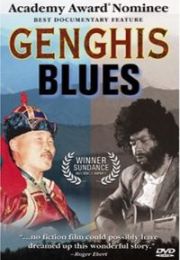 I watched the documentary
I watched the documentary  Yahoo Groups were a big new thing then, and I formed a group for Tuvan Throat Singing. It gradually got about 500 members, as I recall. Through this network I learned that a Tuvan group called
Yahoo Groups were a big new thing then, and I formed a group for Tuvan Throat Singing. It gradually got about 500 members, as I recall. Through this network I learned that a Tuvan group called  The signing at
The signing at 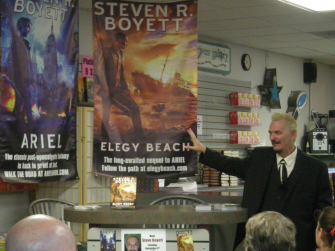
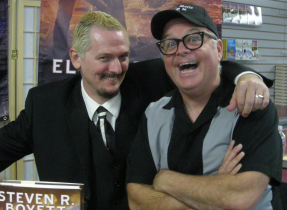
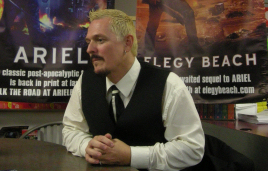

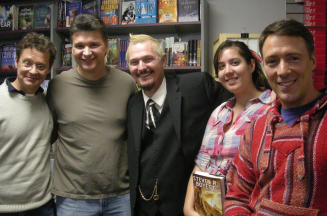
 I promised myself this blog was going to be an ongoing series of essays and conversations on a variety of topics — writing, science fiction & fantasy, authorship & intellectual property in the 21st Century, the remix as metaphor for the art of our age, occasional reports on events and the status of books & various projects. What I promised myself it would not be is a billboard for me and my work. We already get more than enough spam in our lives without me adding to the heap, I think.
I promised myself this blog was going to be an ongoing series of essays and conversations on a variety of topics — writing, science fiction & fantasy, authorship & intellectual property in the 21st Century, the remix as metaphor for the art of our age, occasional reports on events and the status of books & various projects. What I promised myself it would not be is a billboard for me and my work. We already get more than enough spam in our lives without me adding to the heap, I think.